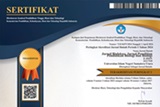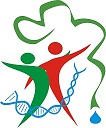Enhancing students' digital literacy: Evaluating the effectiveness of notion-based e-modules
Abstract
This study aims to investigate the effect of using Notion-based e-modules to improve students' digital literacy. The study was implemented in the odd semester of the 2023/2024 academic. This study used a quasi-experimental method with a quantitative approach. The design of the study used a pretest-posttest control group design. The data obtained were analyzed using a t-test to compare the results. The finding of study shows that the average pretest and posttest scores in the control class show a difference score of (0.52) less than the experimental class (22.00). Meanwhile the percentage of score increase obtained in the control class is (0.79%) lower than in the experimental class (33.28%). So it can be concluded that the increasing score of students’ digital literacy in the experimental class higher than the control class. Based on the results of data analysis using the t-test showed a significant increase scores in posttest compared to pretest score (t(62)= 82.76, p<0,0001), the control group also showed increase scores but not significantly different between the pretest and posttest scores (t(59)= 1,95, p=0.0571). It can be interpreted that the experimental group showed a more significant increase compared to the control group. So, the conclusion of the study show that the use of Notion-based E-modules has a significant impact on improving students' digital literacy. Further research is recommended to expand the scope of subjects from other study programs and compare the effectiveness of Notion with other digital platforms.
Keywords
Full Text:
PDFReferences
Andoro, Ign. F. B. S. (2023). Pemanfaatan Efektifitas Penggunaan Aplikasi Notion Dalam Meningkatkan Perkuliahan Secara Efektif Dan Efisien di STMIK Widya Pratama Pekalongan. Digital Transformation Technology, 3 (2), 832–840. https://doi.org/10.47709/digitech.v3i2.3343
Alfionora, R., Ardi & Darussyamsu, R. (2021). Blended Learning Berbasis Edmodo Terhadap Efektivitas Pembelajaran Biologi: Kajian Meta-Analisis. Jurnal Biolokus: Jurnal Penelitian Pendidikan Biologi Dan Biologi, 4(2), 104–111. DOI: http://dx.doi.org/10.30821/biolokus.v4i2.994
Baharuddin, R. A., Rosyida, F., Irawan, L. Y., & Utomo, D. H. (2022). Model pembelajaran self-directed learning berbantuan website notion: meningkatkan kemampuan berpikit kritis siswa SMA. Jurnal Inovasi Teknologi Pendidikan, 9 (3), 245–257. https://doi.org/10.21831/jitp.v9i3.52017
Bahtiar, A. Z., Ahdar, & Yanti, N. E. (2023). Progressive Literacy Task: Design Strategy of digital literacy and competencies in learning outcomes. Al-Ishlah: Jurnal Pendidikan Islam, 21(1), 49–58. https://doi.org/10.35905/alishlah.v21i1.5284
Cahyani, A., Agustin, D., Muslimah, I., & Khulliyatunnisa, N. (2023). Peran Aplikasi Notion dalam Perkuliahan untuk Mewujudkan Produktivitas Mahasiswa. Jurnal Pendidikan, Sains Dan Teknologi (JPST), 2(2), 262–273. http://jurnal.minartis.com/index.php/jpst/
Dagar, V., & Yadav, A. (2016). Constructivism: A Paradigm for Teaching and Learning. Arts and Social Sciences Journal, 7(4). https://doi.org/10.4172/2151-6200.1000200
Delima, Budiarta, K., & Hasyim. (2021). Ekuitas: Jurnal Pendidikan Ekonomi The Using of E-module as Teaching Materials Development to Improve Students’ Learning Outcomes at SMA Swasta BPI Paluh Kurau. © Ekuitas: Jurnal Pendidikan Ekonomi, 9(2), 212–221.
Dewi, L. P. D. K., Utami, I. G. A. L. P., & Santosa, M. H. (2024). The Importance of Digital Literacy Skills in the Context of Learning English for Specific Purposes: A Systematic Review. Jurnal Indonesia Sosial Teknologi, 5(8), 3006. http://jist.publikasiindonesia.id/
Faresta, R. A. (2023). The Urgency Of Digital Literacy Skills For Educators To Face Global Challenges In Society 5.0 Era. Jurnal Kependidikan, 8(2), 1–6.
Fitroh, I., Disman, Komalasari, K., & Ruhimat, M. (2024). The Digital Literacy Instruments for University Students. Journal of Education Technology, 7(4), 653–661. https://doi.org/10.23887/jet.v7i4.67099
Hague, C., & Payton, S. (2010). Digital literacy across the curriculum a Futurelab handbook. Futurelab. www.futurelab.org.uk/
Haleem, A., Javaid, M., Qadri, M. A., & Suman, R. (2022). Understanding the role of digital technologies in education: A review. Sustainable Operations and Computers, 3, 275–285. https://doi.org/10.1016/j.susoc.2022.05.004
Hardiansyah, A., Andas, N. H., & Jasuli, D. (2024). The Role Of Digital Technology In Improving Literacy Skills Of Primary School Students. International Journal of Social and Education (INJOSEDU), 1(4), 1104–1116.
Herlina, S., Kusumah, Y. S., & Juandi, D. (2023). DIGITAL LITERACY: STUDENT PERCEPTION IN MATHEMATICS LEARNING. AKSIOMA: Jurnal Program Studi Pendidikan Matematika, 12(3), 3115. https://doi.org/10.24127/ajpm.v12i3.7561
Hoa, M.A, L. T. (2023). A Study on the Effect of Technology in Enhancing Spoken Language Proficiency. International Journal of Social Science and Human Research, 6(11). https://doi.org/10.47191/ijsshr/v6-i11-15
Hogg, R. V, McKean, J. W., & Craig, A. T. (2019). Introduction to Mathematical Statistics (8th ed.). Pearson.
Husamah, H., Adlini, N., Luzyawati, L., & Lestari, N. (2024). Trends and coverage of strengthening literacy in biology learning: Systematic literature review of the Scopus database in four decades. Jurnal Biolokus: Jurnal Penelitian Pendidikan Biologi Dan Biologi, 7(1).
DOI: http://dx.doi.org/10.30821/biolokus.v7i1.3550
Iskandar, J., Sukriyah, Chidir, G., & Simorangkir, Y. N. (2024). Indonesian Journal of Management and Economic Research Digital Literacy and Entrepreneurial Attitudes: A Study of Indonesian University Students. Indonesian Journal of Management and Economic Research, 1(2).
Ismail, I. A., & Febriyanti, A. (2022). The Role of Interpersonal Communication Between Teachers and Students to Improve the Success of the Learning Process. International Journal of Progressive Sciences and Technologies (IJPSAT, 30(2), 37–41. http://ijpsat.ijsht-journals.org
Jakonen, T., & Jauni, H. (2021). Mediated learning materials: visibility checks in telepresence robot mediated classroom interaction. Classroom Discourse, 12(1–2), 121–145. https://doi.org/10.1080/19463014.2020.1808496
Javaid, S., Saeed, N., Qadir, Z., Fahim, H., He, B., Song, H., & Bilal, M. (2023). Communication and Control in Collaborative UAVs: Recent Advances and Future Trends. https://doi.org/10.1109/TITS.2023.3248841
Jihan, Iswantara, N., Murniarti, E., Nindiasari, H., & Arini, I. (2023). Reviewing the Effectiveness of Educational Technologies in Enhancing Student Learning Outcomes. International Journal Publishing INFLUENCE: International Journal of Science Review, 5(1), 2023. https://influence-journal.net/index.php/influence/index223
Kalyani, L. K. (2024). The Role of Technology in Education: Enhancing Learning Outcomes and 21st Century Skills. International Journal of Scientific Research in Modern Science and Technology, 3(4), 05–10. https://doi.org/10.59828/ijsrmst.v3i4.199
Kumar, P. C., Chetty, M., Clegg, T. L., & Vitak, J. (2019, May 2). Privacy and security considerations for digital technology use in elementary schools. Conference on Human Factors in Computing Systems - Proceedings. https://doi.org/10.1145/3290605.3300537
Leow, F.-T. (2014). Interactive Multimedia Learning: Innovating Classroom Education In A Malaysian University. TOJET: The Turkish Online Journal of Educational Technology, 13(2), 99–110.
Lunenburg, F. C., & Lunenburg, M. R. (2014). Applying Multiple Intelligences in the Classroom: A Fresh Look at Teaching Writing. International Journal Of Scholarly Academic Intellectual Diversity, 16(1).
Mane, P., Yadav, B., Gunjal, K., Karande, S., & Mandavkar, M. (2024). Study Notion Website Using Full Stack Web Development. International Research Journal of Modernization in Engineering Technology and Science, 06(05), 4860–4868. https://doi.org/10.56726/irjmets53187
Markevych, Y., Khavanska, A., & Filenko, I. (2022). Improving Students’ Ability to Communicate Interpersonally in English Classroom Discussions through Group Dynamics Implementation. JELITA: Journal of English Language Teaching and Literature, 3(1), 34–43.
Martha, J. A., Pratikto, H., & Rahayu, W. P. (2024). Inovasi Website Notion Sebagai Platform Pembelajaran Interaktif Berbasis Proyek. Research and Development Journal of Education, 10(1), 605–616. https://doi.org/10.30998/rdje.v10i1.23521
Murnane, R., Snow, C., & Sawhill, I. (2012). Literacy Challenges for the Twenty-First Century: Introducing the Issue. The Future of Children, 22(2). https://doi.org/10.2307/23317408
Nguyen, L. A. T., & Habók, A. (2024). Tools for assessing teacher digital literacy: a review. Journal of Computers in Education, 11(1), 305–346. https://doi.org/10.1007/s40692-022-00257-5
Nilaphruek, P., & Charoenporn, P. (2023). Knowledge Discovery and Dataset for the Improvement of Digital Literacy Skills in Undergraduate Students. Data, 8(7). https://doi.org/10.3390/data8070121
Oanh, P. T. K., & Nhung, N. T. H. (2022). Constructivism learning theory: A Paradigm for Teaching and Learning English in secondary education in Vietnam. International Journal of Scientific and Research Publications, 12(12), 93–98. https://doi.org/10.29322/ijsrp.12.12.2022.p13211
Rakasiwi, R., & Listyani, L. (2020). Students’ Perceptions Toward The Effectiveness Of Collaborative Brainstorming In Academic Writing Classes. SAGA: Journal of English Language Teaching and Applied Linguistics, 1(2). https://doi.org/10.21460/saga.2020.12.13
Salsabila, S. S., Rohmadani, A. I., Mahmudah, S. R., Fauziyah, N., & Sholihatien, R. A. N. (2022). Tantangan Pendidikan Multikultural Di Indonesia Di Zaman Serba Digital. ANWARUL : Jurnal Pendidikan Dan Dakwah, 2(1), 99–110. https://ejournal.yasin-alsys.org/index.php/anwarul
Sharma, A. (2022). Teaching Digital Privacy: Navigating the Intersection of Technology, Education, and Privacy. International Journal of Humanities,Law and Social Sciences, 9(2), 154–161. www.kanpurhistorians.org
Sharma, A., & Singh, A. (2024). Digital Literacy: An Essential Life Skill in Present Era of Education. In S. Ahmad, M. I. Hussain, & R. K. Kushwaha (Eds.), Transforming Learning: The Power of Educational Technology (1st ed., pp. 118–125). Bluerose. https://www.researchgate.net/publication/381408329
Sharma, V. K., Manik, A., Thakur, K., Kumar, M., & Solanki, H. (2024). Study Notion Empowering Learners Through Personalized AI Driven Learning Educational Administration: Theory and Practice. Educational Administration: Theory and Practice, 30(5), 11073–11078. https://doi.org/10.53555/kuey.v30i5.4891
Silva-Quiroz, J., & Morales-Morgado, E. M. (2022). Assessing digital competence and its relationship with the socioeconomic level of Chilean university students. International Journal of Educational Technology in Higher Education, 19(1). https://doi.org/10.1186/s41239-022-00346-6
Siswati, B. H., & Suratno. (2024). RFDT learning: A pathway to elevated metacognitive and communication skills in biology education. Jurnal Biolokus: Jurnal Penelitian Pendidikan Biologi Dan Biologi, 7(1), 70–78.
Stolpe, K., & Hallström, J. (2024). Artificial intelligence literacy for technology education. Computers and Education Open, 6, 100159. https://doi.org/10.1016/j.caeo.2024.100159
Sucipto, M. A. B. (2024). Digital Literacy and Career Guidance: A Study on University Students in Indonesia. West Science Social and Humanities Studies, 02(05), 888–898.
Sukma, R. I., Purwianingsih, W., & Amprasto. (2023). An analysis of digital literacy skills of high school students in biology. Jurnal Biolokus: Jurnal Penelitian Pendidikan Biologi Dan Biologi, 6(2), 136–143.
Syahrin, M. (2023). Enhancing Student Learning Outcome in PAI| 145 Enhancing Student Learning Outcomes in PAI and Ethics Through Notion Application Utilization. Journal of Islamic Studies and Society, 4(2), 145–159. https://doi.org/10.35905/aliftah.v4i2
Thelma, C. C., Sain, Z. H., Shogbesan, Y. O., Akpan, W. M., & Phiri, E. V. (2024). Digital Literacy in Education: Preparing Students for the Future Workforce Article in. International Journal of Research (IJR) International Journal of Research, 11(8), 327–344. https://doi.org/10.5281/ZENODO.13347718
UNESCO. (2018). A Global Framework of Reference on Digital Literacy Skills for Indicator 4.4.2. http://www.uis.unesco.org
Wang, C., Zhang, M., Sesunan, A., & Yolanda, L. (2023). Technology-driven education reform in Indonesia : A Look Into The Current Status of The Merdeka Belajar Program. Kementerian Pendidikan, Kebudayaan, Riset dan Teknologi. http://repositori.kemdikbud.go.id/id/eprint/30538
Zhang, K., & Pochuieva, O. (2023). Matching Degree Between University Students’ Digital Literacy and the Current Situation of Mobile Language Learning. International Journal of Interactive Mobile Technologies, 17(14), 177–189. https://doi.org/10.3991/ijim.v17i14.41185
DOI: http://dx.doi.org/10.30821/biolokus.v7i2.3999
Refbacks
- There are currently no refbacks.
Copyright (c) 2024 Jurnal Biolokus: Jurnal Penelitian Pendidikan Biologi dan Biologi
indexed by :












